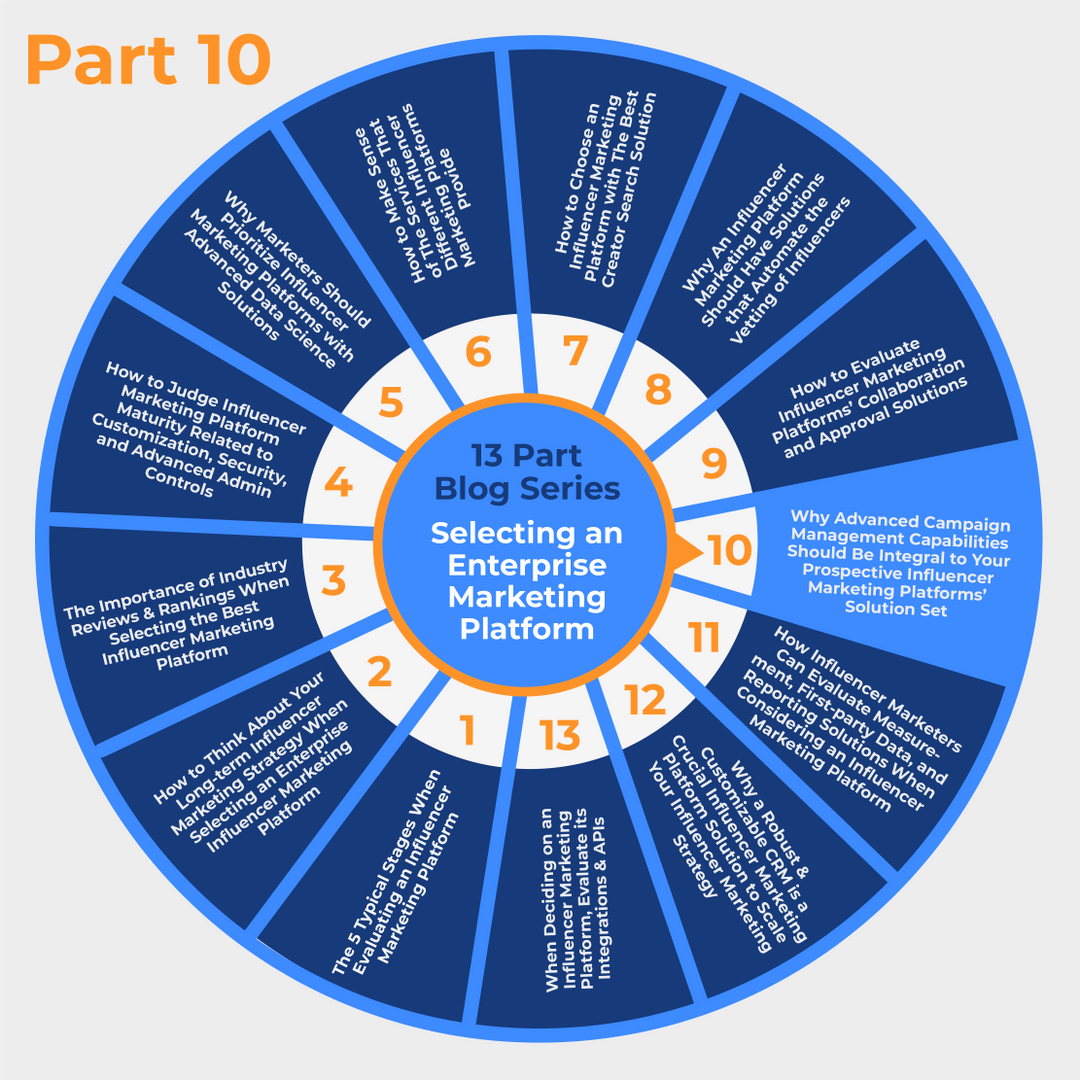Campaign management is the glue that holds an influencer marketing initiatives together. While a successful influencer search and approval process sets up a campaign for success, the key to delivering with excellence lies in efficient, centralized, and flexible campaign management.
Download the Platform Buying Guide and Workbook
Manually managing complex influencer marketing campaigns, or multiple campaigns at once, while chasing down influencers and their representatives over email for content, contracts, tax forms, or reports is a chaotic process that is unsustainable for a long-term influencer strategy. An influencer marketing platform should be able to alleviate any friction in the campaign management process and deliver centralized capabilities that can be customized for different campaigns or particular needs.
Consider your own influencer campaign process. What is causing friction and where can improvements be made? Prioritize these features when evaluating influencer marketing platforms.
Pro-Tip:
Map out your typical process – complete with pain points and inefficiencies – so that you have your priorities top-of-mind when briefing the different platforms.
Question to Ask:
- Ask how many campaigns you need to run through the platform before you master the campaign management features.
The full suite of capabilities that will ensure a centralized approach to campaign management can be broken down into four categories:
- Setup
- Communication
- Financial & Legal
- Tracking & Measurement
Setup
Find a platform with flexible solutions for setting up campaigns, including options for different benchmarks and variable scopes of responsibilities of influencers or stakeholders involved in the process. A platform should be able to generate dynamic microsites with campaign details, and in the end, provide options for templating, which will make future campaign setups easier.
Make sure the platform also has an API to connect to the other technologies you use. An influencer marketing platform should connect seamlessly with your CRM, your account management software, and your analytics dashboards. We discussed considerations for APIs and permissions in Article #4.
Communication
Every person involved in a campaign - team members, influencers, agency reps - should have direct access to the platform and its collaboration features. A platform should allow collaborators to set up deadlines, provide real-time feedback, share content approvals, or relay necessary pivots and adjustments. Centralized communication features ensure consistency so nothing falls through the cracks in the process.
Financial & Legal
Depending on which channels you plan to use for your campaign, and in which countries you plan to run it, the legal and financial regulations on paying influences and promoting content may vary. The right influencer marketing platform should keep all of your financial and legal documents in one place, accessible at any time to the appropriate users. A platform should offer streamlined access to tax forms, contracts, and compliance information, as well as disclosure forms or any other legal documents that your team requires.
A capable platform will also offer multiple ways to pay influencers depending on their preferences, currency, or regional restrictions.
Tracking And Measurement
In order to be able to report on the successes and challenges of an influencer campaign, including ROI, it’s necessary to track its journey from start to finish. An influencer marketing platform should be able to generate UTM codes and automate shortlink tracking. Real-time reporting on budget and KPIs will help to identify early successes or failures, allowing for adjustments where necessary.
Direct access to influencer profiles and data also allows for control over metrics throughout the campaign, as well as for analytics and optimization after the campaign has ended. This will also ensure your company’s ownership over data, which we will discuss in the next blog post.
With so many variables to consider, it’s helpful to create a checklist of the needs your team has for campaign management features within an influencer marketing platform. For inspiration, download the CreatorIQ checklist template here.
The Takeaway
Setting up and managing a campaign centrally through a fully capable influencer marketing platform, with real-time collaboration and tracking features, will secure a smooth run of any campaign, even if you’re running many at the same time. A proper campaign setup is key to ensuring accurate analytics and reporting as well. Furthermore, the option to optimize and template your campaigns will set your influencer marketing strategy for long-term sustainable success.
There are several other things to consider when choosing an influencer marketing platform. Our next blog post will discuss the importance of evaluating measurement, first-party data, and reporting solutions. Get the complete Guide & Workbook for Selecting an Enterprise Influencer Marketing Platform or stay tuned for the next post.
Be sure to catch up on the rest of our 13-part series dedicated to helping you find the right influencer marketing platform using the directory below.
Selecting an Enterprise Marketing Platform
13 Part Blog Series
- The 5 Typical Stages When Evaluating an Influencer Marketing Platform
- Thinking about Your Long-term Influencer Marketing Strategy
- The Importance of Industry Reviews & Rankings When Selecting the Best Influencer Marketing Platform
- How to Judge Influencer Marketing Platform Maturity Related to Customization, Security, and Advanced Admin Controls
- Why Marketers Should Prioritize Influencer Marketing Platforms with Advanced Data Science Solutions
- How to Make Sense of The Services That Different Influencer Marketing Platforms Provide
- How to Choose an Influencer Marketing Platform with The Best Creator Search Solution
- Why An Influencer Marketing Platform Should Have Solutions that Automate the Vetting of Influencers
- How to Evaluate Influencer Marketing Platforms’ Collaboration and Approval Solutions
- Why Advanced Campaign Management Capabilities Should Be Integral to Your Prospective Influencer Marketing Platforms’ Solution Set
- How Influencer Marketers Can Evaluate Measurement, First-party Data, and Reporting Solutions When Considering an Influencer Marketing Platform
- Why a Robust & Customizable CRM is a Crucial Influencer Marketing Platform Solution to Scale Your Influencer Marketing Strategy
- When Deciding on an Influencer Marketing Platform, Evaluate its Integrations & APIs

